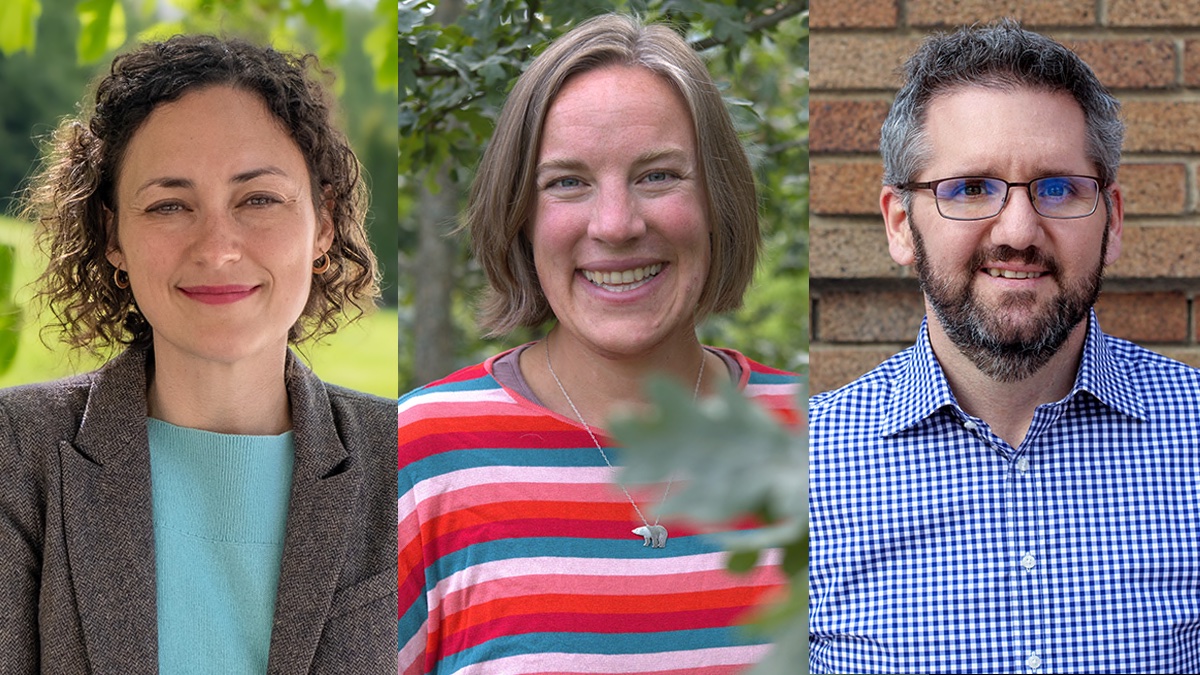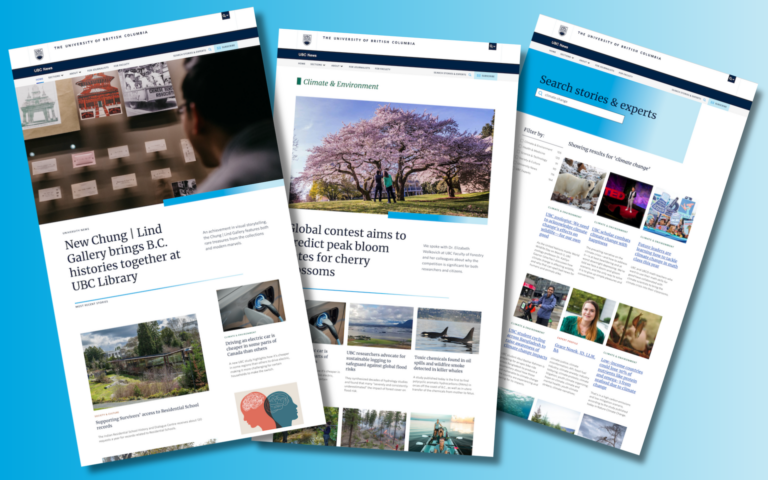World-leading scientists named Canada Excellence Research Chairs at UBC
Drs. Kayla King, Isla Myers-Smith, and Corey Stephenson have been appointed Canada Excellence Research Chairs at UBC.

Left to right: Dr. Kayla King, Dr. Isla Myers-Smith and Dr. Corey Stephenson have been named Canada Excellence Research Chairs at the University of British Columbia.
Three internationally renowned scientists have been named Canada Excellence Research Chairs at the University of British Columbia.
Their research aims to address some of the world’s most pressing challenges, from uncovering disease dynamics in the face of climate change to developing ecosystem conservation strategies and creating more efficient and sustainable processes for manufacturing medicines and agricultural chemicals.
Dr. Kayla King has been appointed as the Canada Excellence Research Chair in Evolutionary Dynamics of Host-Pathogen Interactions, while Dr. Isla Myers-Smith will hold the Canada Excellence Research Chair in Global Change Ecology of Northern Ecosystems. Dr. Corey Stephenson, who will be joining UBC in June 2024, will hold the Canada Excellence Research Chair in Innovative Synthetic Methods for Translational Chemistry.
The Canada Excellence Research Chairs (CERC) program was established by the federal government in 2008 to strengthen Canada’s ability to attract the world’s top researchers. UBC will receive up to $24 million over eight years to support these three new chairs and their teams to establish ambitious research programs.
“On behalf of UBC, I would like to extend my warmest congratulations to our three newest Canada Excellence Research Chairs,” says UBC President and Vice-Chancellor, Dr. Benoit-Antoine Bacon. “Their commitment to scientific discovery is a testament to the calibre of research excellence we strive for at UBC. The ripple effects of their research will drive forward advancements that will touch the lives of every Canadian and further position Canada as a global leader in science and innovation.”
Understanding disease dynamics in a warming world

As the Canada Excellence Research Chair in Evolutionary Dynamics of Host-Pathogen Interactions, Dr. Kayla King’s research focus is on evolutionary and ecological interactions between animal hosts and microbial pathogens. Microbial pathogens are tiny, often invisible organisms, such as viruses and bacteria, that can cause diseases in humans and animals.
Climate change is causing extreme heating and altering the distribution of microbial pathogens, while associated human activity and biodiversity loss are increasing human-animal contact—factors that might contribute to infectious diseases becoming more prevalent.
Dr. King’s research has implications for predicting virulence, transmission, and the tempo of evolution as microbial pathogens emerge in animals or move to new areas with shifting climates.
“My research aims to better understand the evolution of infection and immunity in a changing world,” she says. “The program will assess the impacts of climate change on pathogen evolution and host susceptibility, and study pathogen evolution after jumps across animal species. We hope to better predict changes in virulence and transmission, informing wildlife conservation, and helping us get ahead in the race against future pandemics.”
Dr. King, who received her undergraduate degree in biology from UBC, returned after 10 years of teaching and research in Oxford University’s Department of Biology and Christ Church College. She is a professor in the departments of zoology, and microbiology and immunology, in UBC’s faculty of science.
Effects of climate change on northern ecosystems
As the Canada Excellence Research Chair in Global Change Ecology of Northern Ecosystems, Dr. Isla Myers-Smith’s research aims to capture the transformation of tundra and boreal forest ecosystems in response to warming temperatures and shifting seasonality.

The rapidly warming climate is reshaping the planet’s biodiversity. At northern latitudes, warming is four times greater than the global average and impacts are particularly pronounced. Dr. Myers-Smith and her research team will explore how climate change is altering tundra vegetation change, wildlife habitats, movement of species and the collective impact of these changes on livelihoods of Indigenous communities in the Yukon and Northwest Territories.
“The impacts of climate change are rapidly reshaping the Canadian North,” says Dr. Myers-Smith. “Over the next eight years, my team will study how the transformation of tundra and boreal ecosystems alters wildlife habitats, movement of species and the impact of these changes on the livelihoods of Indigenous communities.”
The program will establish a Climate Change Ecology Research Hub in the Western Canadian North to bring together experts from Indigenous communities, government agencies and academic researchers to establish common infrastructure and data collection to facilitate ecological and drone monitoring capabilities in the Western Canadian North. Their research will integrate field research, remote sensing, data synthesis and community engagement to address critical research questions about northern ecosystems experiencing rapid and accelerating climate change and the resulting implications for northern communities.
A professor in the department of forest and conservation sciences in UBC’s faculty of forestry, Dr. Myers-Smith received her bachelor of science degree from UBC. She most recently worked for 10 years as a professor at the University of Edinburgh before returning to UBC in July 2023.
Paving the way for next-generation medicines and sustainable manufacturing
Advances in areas like pharmaceuticals, agrochemistry, and energy are being driven by innovations in chemistry research, including new methods for creating or synthesizing chemicals or molecules in a more efficient manner. These new methods are providing scientists with improved capabilities to produce desired substances or achieve specific reactions that might have been challenging or even impossible with older techniques.

As the Canada Excellence Research Chair in Innovative Synthetic Methods for Translational Chemistry, Dr. Corey Stephenson will be spearheading the creation of new methods that involve photo- and electro-catalytic methods—techniques that use light and electricity to accelerate and improve chemical reactions. These methods offer several advantages: they work well with a wide range of chemical groups with mild reactions, can be scaled up easily, and are straightforward to use.
Dr. Stephenson, who was born and raised in Ontario, received his undergraduate degree in chemistry from the University of Waterloo. He completed his PhD at the University of Pittsburgh and began his independent career at Boston University before joining the University of Michigan in 2013. He will be joining UBC in June 2024 as a professor in the department of chemistry in the faculty of science, and the department of biochemistry and molecular biology in the faculty of medicine. Dr. Stephenson will also be joining the BC Cancer Research Institute as a research scientist.
“Returning to Canada as a Canada Excellence Research Chair at UBC, a world leader in innovation, fills me with excitement about the tremendous opportunity,” he says. “The Canadian government’s substantial investment in fundamental and translational research underscores their dedication to propelling the nation to the forefront of research and innovation, and to accelerate the transformation of scientific breakthroughs into real-world solutions.”
Dr. Stephenson and his research team will be designing new tools that use light and electricity for use in drug creation and improving plant-protecting chemicals, using advanced data analysis to perfect their approaches. Additionally, they will be developing efficient ways to discover and refine these techniques. Their work will have important implications for health research, laying down the building blocks for the next generation of medicines, and will contribute to more environmentally friendly manufacturing processes.
Interview language(s): English



